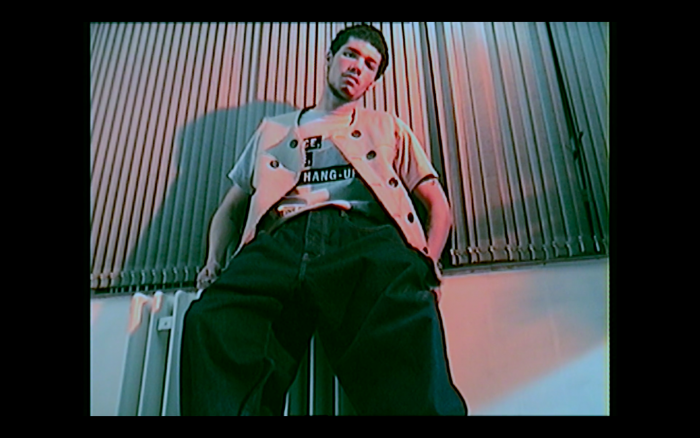
Fashion designer Martine Rose, started her career after graduating from university in 2002, initially designing for a label she set up with some friends called LMNOP. It was a small t-shirt label, that grew into a full unisex collection. After five seasons, she decided to set up her own eponymous Menswear label in 2004, for which she has been designing ever since.
gal-dem caught up with her to discuss the inspiration behind her latest Martine Rose collection, how she got into the industry and what advice she would give to aspiring designers.
gal-dem: Hi Martine, we’d love to know, what are you up to at the moment?
Martine Rose: As you know, I took SS16 off to have a baby, so AW16 was my first season back after a little while. I’m focusing on the label, and also doing some consultancy work, but mainly just getting back into the swing of things really. And really enjoying it!
That’s great to hear! We really loved your comeback AW16 fashion film directed by Sharna Osborne, it was very suggestive…What was the inspiration behind it?
I started looking at Robert Mapplethorpe, and listening to a lot of Smokey and Mark E. Smith (Smokey’s I’ll Always Love You soundtracks the film). I was looking at sexuality, particular the underground gay scene of the 1970s, and exploring the work of photographers other than Mapplethorpe, most of whom are uncredited because it was illegal during those times. This really interesting story started to read itself out of my research and this was the result. I watched a lot of Kenneth Anger films too.
 Still from the Martine Rose AW16 fashion film
Still from the Martine Rose AW16 fashion film
How long did it take you to come up with this concept?
I’m resistant to say it was a concept, I don’t work so rigidly with concepts. It was more an area of interest at the time, and a development from my SS15 work where I just designed one look. It was actually an expansion of those themes and ideas. So I’ve been thinking about it and adding to it for over a year, it was a slow burner, which is nice because I had the opportunity for the ideas to really form.
When was your first love affair with fashion?
It’s difficult to pin-point. I’m not one of those people who always knew and had a burning desire to be in fashion from a young age. I’m the youngest of a big family, so I always used to watch my sister and cousins get dressed to go out, and my interest in fashion really piqued at that point. Although it wasn’t really defined as fashion, I was just really interested in seeing what was happening. It was this “otherness”, this alternative, cool scene that I didn’t have access to because I was too young. But [fashion design] didn’t become a clear, firm thing until much later when I went to art school.
Do you remember the first thing you designed?
It was this really strange cocoon “dress” (I use this term loosely) made out of a Norwegian blanket that I cut up and shaved. It was very conceptual.
How would you describe your experience of the fashion industry as a WoC? Do you think it is more accepting than other industries?
There aren’t many other black designers, and that is not due to a lack of talent, so that is something to be noted. At the end of the day fashion is an establishment. Designers themselves tend to be alternative thinkers, but the industry is establishment. So the same challenges exist in fashion as they do elsewhere with proper black representation.
Do you think designers of colour have more of a responsibility to improve representation, for instance by using more models of colour?
I don’t think you can set rules, the individual has to believe that is important themselves. Already it’s hard in an industry when there aren’t that many other black faces. It’s like in any industry, you have your foot in the door, and then you have to start establishing yourself. But ultimately it’s up to the individual.
What advice would you give to young aspiring designers, particularly WoC?
There is a lot of silliness in the industry, based on stuff that isn’t really important, it can be exhausting and it can make you question yourself a lot. But I don’t want to sound too negative, because fashion is so important and enriching culturally. Ultimately, I’d say “just do it”. It is an amazing privilege to wake up every day, and to work with the people that you want to work with, and to talk about what excites you and have people respond to that.
What is important is your integrity; your ability to stick to your ideas and trust that they are good, but in addition, to also be able to take on other people’s opinions. Try to stick to your own path, although it may take longer, because ultimately it pays off. What I always say to my students is that there is so much more value in your own experience, who you are, and what has formed you. That is what is going to give you your individual voice. With me, it was my early experience of fashion that I come back to time and time again.
Contrary to popular belief, fashion actually attracts outsiders: people who genuinely don’t think that they are cool within themselves, so they think they have to look outside for inspiration. But, whether you’re from a tiny village in Shropshire or an estate in King’s Cross, it doesn’t matter. Your own voice is the only thing you have that is authentic, as no one else has had that experience. It’s easy to borrow from trends, and to look at other designers, but that doesn’t have any real value or longevity, because trends come and they go.
In short, don’t shy away from the value of who you really are. Use it to form the basis of your own taste and style. That’s where race comes into it, you could talk about your own experience as, say, a black woman.
That’s really comprehensive, honest advice, thank you! So, what can we expect from you next?
I’m not much of a planner to be honest, I practice my work as I live, which is instinctive. If something feels good then I continue. I’m really happy to be back doing what I think is important, expanding and challenging myself with the label.









